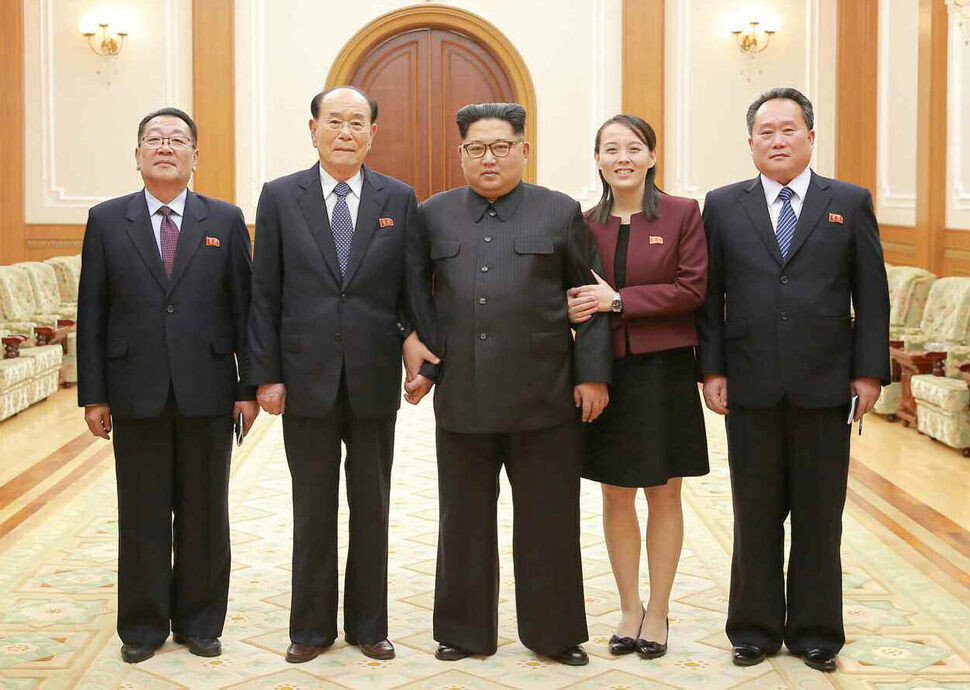hankyoreh
Links to other country sites 다른 나라 사이트 링크
Kim Jong-un orders measures to develop inter-Korean relations

The North Korean media reported that North Korean leader Kim Jong-un was briefed on the results of the high-ranking delegation’s visit to South Korea on Feb. 9-11 and that he gave specific orders about ways to develop inter-Korean relations in the future. Since Kim not only sent a special envoy but now appears to be personally taking follow-up measures, the restoration of inter-Korean relations is expected to accelerate.
The Rodong Sinmun, official organ of the North Korean Workers’ Party (KWP), reported on Feb. 13 that Kim met with Supreme People’s Assembly Presidium President Kim Yong-nam and other members of the high-ranking delegation on Feb. 12 and was briefed on their activities during their visit to South Korea. KWP Central Committee First Vice Director Kim Yo-jong, who was dispatched as a special envoy, also provided a detailed report about “South Korean intentions and American movements ascertained during the period of activity,” the newspaper added. After being briefed by the delegation, Kim expressed his satisfaction as well as his gratitude for South Korea’s impressive display of sincerity, the Korean Central News Agency (KCNA) reported.
“It’s important to further elevate this positive atmosphere for reconciliation and dialogue and to continue to build upon excellent results,” Rodong Sinmun quoted Kim as saying, while reporting that he had given orders to take practical measures to develop inter-Korean relations.
Although the details of Kim’s orders were not made public, the North’s proactive behavior so far this year suggests that this will lead to diverse forms of inter-Korean exchange and contact in a variety of areas. South and North Korea have already created the basic framework for this, agreeing during a high-level meeting on Jan. 9 in Panmunjeom to hold talks to resolve military tensions; to promote cooperation, exchange, contact and visits in various fields; and to hold talks between senior officials and in various areas to improve inter-Korean relations.
As a result, the South Korean government’s first goal is likely to be Red Cross talks aimed at arranging reunions for the families divided by the Korean War. While North Korea has demanded the repatriation of the group of female employees who defected from a North Korean restaurant in China as a precondition for these reunions, South and North Korea’s efforts to restore relations make it likely that they will find a workaround to this issue.
There also need to be another round of working-level talks about North Korea’s participation in the Pyeongchang Winter Paralympic Games. During a meeting between vice ministers on Jan. 17, North Korea indicated that it plans to send a delegation of more than 150 people, including Paralympic athletes and a cheerleading squad, to South Korea. Another big question is whether the door will be opened to private-sector exchange, which has been strictly prohibited. Since the new administration took over last May, private-sector organizations have submitted a total of 243 applications to make contact with the North.
The most pressing issue is preparing for a third inter-Korean summit, in response to the invitation made by Kim Jong-un. Creating the “right conditions” mentioned by South Korean President Moon Jae-in will require coordination between South and North Korea on matters including denuclearization. “One argument is that there must be progress on the North Korean nuclear issue before a summit can be held, but conversely that a summit could be used to make headway on resolving the North Korean nuclear issue. We need to start thinking that South and North Korea can make the first move to bring about North Korea-US talks,” said Kim Yeon-cheol, a professor at Inje University,.
By Jung In-hwan, staff reporter
Please direct questions or comments to [english@hani.co.kr]

Editorial・opinion
![[Guest essay] The real reason Korea’s new right wants to dub Rhee a founding father [Guest essay] The real reason Korea’s new right wants to dub Rhee a founding father](https://flexible.img.hani.co.kr/flexible/normal/500/300/imgdb/original/2024/0423/8317138574257878.jpg) [Guest essay] The real reason Korea’s new right wants to dub Rhee a founding father
[Guest essay] The real reason Korea’s new right wants to dub Rhee a founding father![[Column] ‘Choson’: Is it time we start referring to N. Korea in its own terms? [Column] ‘Choson’: Is it time we start referring to N. Korea in its own terms?](https://flexible.img.hani.co.kr/flexible/normal/500/300/imgdb/original/2024/0423/3617138579390322.jpg) [Column] ‘Choson’: Is it time we start referring to N. Korea in its own terms?
[Column] ‘Choson’: Is it time we start referring to N. Korea in its own terms?- [Editorial] Japan’s rewriting of history with Korea has gone too far
- [Column] The president’s questionable capacity for dialogue
- [Column] Are chaebol firms just pizza pies for families to divvy up as they please?
- [Column] Has Korea, too, crossed the Rubicon on China?
- [Correspondent’s column] In Japan’s alliance with US, echoes of its past alliances with UK
- [Editorial] Does Yoon think the Korean public is wrong?
- [Editorial] As it bolsters its alliance with US, Japan must be accountable for past
- [Guest essay] Amending the Constitution is Yoon’s key to leaving office in public’s good graces
Most viewed articles
- 1[Column] ‘Choson’: Is it time we start referring to N. Korea in its own terms?
- 2Senior doctors cut hours, prepare to resign as government refuses to scrap medical reform plan
- 3[Guest essay] The real reason Korea’s new right wants to dub Rhee a founding father
- 4Why Korea shouldn’t welcome Japan’s newly beefed up defense cooperation with US
- 5Opposition calls Yoon’s chief of staff appointment a ‘slap in the face’
- 6New AI-based translation tools make their way into everyday life in Korea
- 7Terry Anderson, AP reporter who informed world of massacre in Gwangju, dies at 76
- 8[Column] The clock is ticking for Korea’s first lady
- 9Samsung barricades office as unionized workers strike for better conditions
- 10Korean government’s compromise plan for medical reform swiftly rejected by doctors